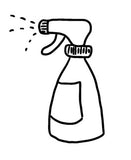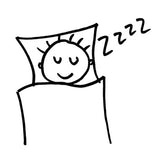The Bedwetting Doctor's Tips & Advice Blog
When to stop wearing nappies at night
Even if your child has good bladder control in the daytime, it can be unclear when to tackle their night time wetting. Wearing nappies or pull ups for as long as possible can seem the best option, but when should your child stop wearing nappies to bed at night?

The impact of bedwetting on mental health
Bedwetting can have a significant impact on a child's mental health. Sadly, as many as 1 in 6 children have a diagnosable mental health problem.

What should I say to someone who is bedwetting?
It’s important to remember how powerful your words can be. What may seem like just a small comment can have a big impact on someone who is affected by bedwetting. Here are some suggestions for how you can provide encouragement and support to someone who is struggling with bedwetting.

Bedwetting during the coronavirus pandemic
We are now in our third lockdown since the start of the coronavirus pandemic. This unusual time has been an intense period of stress and disruption to children, which has unfortunately led to an increase in both daytime toileting accidents and night-time bedwetting in children.

5 tips for managing wet nights
Bedwetting can be stressful for the whole family. Not only is there concern over the wetting itself, but increased laundry loads and tiredness can become a burden. Here are some tips to make wet nights that bit easier…

Should I be worried that my child still wets the bed?
It’s normal to feel worried if your child wets the bed regularly. The topic of bedwetting is often not discussed publicly, which can lead to feelings of shame and concerns that there is something “wrong” with your child. This, in turn, can increase your child’s anxiety over their wetting, creating a negative cycle....

What settings should I use on my bedwetting alarm?
The huge range of models of bedwetting alarms available mean that there are many different options for different settings. What are the key features of these different settings and how can they help to achieve dry nights?

How to support your child on their way to dry nights
Every parent wants the best for their child, so it can be difficult to watch your child suffer with bedwetting...

When should I stop using the bedwetting alarm?
All children take a different length of time to respond to the bedwetting alarm treatment. Some children see results after activating the alarm just a handful of times, whilst others may take a few months to learn to control their bladder overnight.

Daytime and Night-Time Wetting
Night-time bedwetting (nocturnal enuresis) can occur with or without daytime wetting (diurnal enuresis). The processes and treatment involved in these two types of wetting can differ.

Q&A #4
In our latest Bedwetting Q&A, we answer these 2 questions from parents:
Q: I’m getting mixed messages – should I increase or decrease how much my son drinks?
Q: My son turns his alarm off, what can I do?

Auditory Accommodation
You may have seen the term “auditory accommodation” used in the descriptions of some bedwetting alarms. What is it and what can be done about it?

Are you ready for school?
It’s nearly September, which can only mean one thing… back to school! Don’t panic if the summer whizzed by and all those plans to improve your child’s toileting habits or stop their bedwetting over the holidays never happened. We’re here to help!

Minimising the impact of bedwetting
Here’s some of our key advice for how to take control of the situation and minimise the impact that bedwetting has on you and your family...

3 Ways To Succeed With A Bedwetting Alarm
Alarms are the most successful long-term cure for bedwetting. To ensure success with the bedwetting alarm, these are some of our top tips...

Fluid Intake: DOs and DON’Ts
Confused about fluid intake? Here we share some simple DOs and DON'Ts for making sure you are following the right steps on the way to dry nights

Encouraging your child to wear a bedwetting alarm
Alarm treatment is recommended for children aged 5 if they want to become dry. If they seem disinterested at this age, it may be better to wait a little while until they feel ready to become dry. Once a child reaches the age of 7, if they are not regularly achieving dry nights then guidelines state that they should certainly participate in bedwetting treatment...

Bedwetting Q&A #3

At what age should my child be dry at night?
By the age of 4, most children have learnt how to control their bladder during the day, but night time dryness usually takes a little longer to achieve...

Bedwetting Q&A #2

My child doesn’t wake up to their bedwetting alarm
Children often sleep through their bedwetting alarm, much to their parents’ surprise, given how loud bedwetting alarms can be! It’s important that your child wakes up when they wet the bed, to help them to learn to recognise the signal that their bladder is full (never take them to the toilet to empty their bladder whilst they are still sleeping). But, if they are a deep sleeper, how can you ensure that your child wakes up to their bedwetting alarm?

READ MORE
Meeting Your Health Professional
If your child is a regular bedwetter, you might decide to make an appointment with a health professional. They can assess your child’s individual circumstances, test for any underlying medical conditions, and devise an appropriate treatment plan to meet their personal needs. It’s a good idea to be prepared for your meeting so that you can get the most out of your appointment...

How can I help my child?
At least two-thirds of parents worry about their child’s bedwetting. It’s natural to be concerned, especially if your child is upset and frustrated. However, there are several ways in which you can help them through the process of becoming dry.

Should I choose a wearable or wireless alarm?
To maximise a bedwetting alarm’s effectiveness, it is important to choose the right alarm to ensure that it suits each individual child. Our alarms fall into two broad categories: wearable alarms and wireless alarms. When choosing which alarm would suit your child best, this is the first decision to make.
READ MORE- Page 1 of 4
- Next


